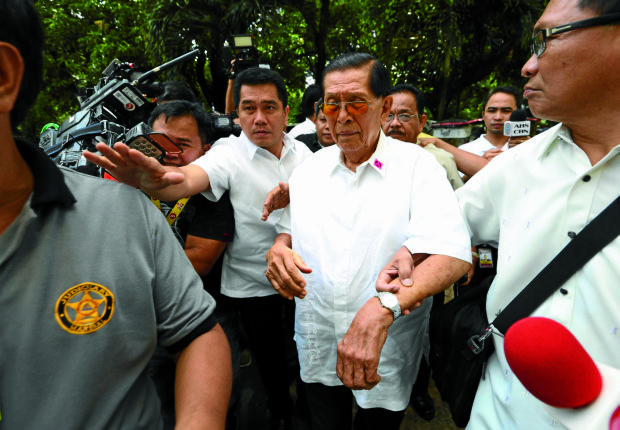The P172.83-million plunder case of former Sen. Juan Ponce Enrile in connection with the pork barrel scam is sufficient enough to proceed to trial, according to the Sandiganbayan.
In a 19-page resolution on Thursday, the antigraft court’s Third Division denied Enrile’s appeal to throw out the charge on the grounds that the allegations do not constitute the elements of a valid plunder case.
The court affirmed the sufficiency of the case and said the defense failed to raise new arguments to warrant the reversal of its Jan. 31 resolution that first denied his motion to quash.
Enrile was charged with plunder and 15 counts of graft in the Sandiganbayan in June 2014 in connection with his alleged diversion of his Priority Development Assistance Fund allocations to fake nongovernment organizations controlled by businesswoman Janet Lim-Napoles.
He was accused of amassing P172.83 million in “commissions” from 2003 to 2010 in collaboration with his former chief of staff, Jessica Lucila “Gigi” Reyes, Napoles and her driver-bodyguard John Raymund de Asis.
Enrile had questioned the June 2014 charge sheet because it supposedly did not state the “particular overt acts” showing unjust enrichment.
He also raised the lack of finer details on his alleged receipt of the kickbacks and the lack of enumeration of anomalous projects linked to alleged scam mastermind Napoles.
But the court maintained that the alleged acts of receiving kickbacks and taking advantage of his official position were
the “overt acts or predicate crimes” stated to make a case for plunder.
Lagging behind
Enrile’s plunder case is currently lagging behind those of detained former Senators Bong Revilla Jr. and Jinggoy Estrada, whose trials are currently scheduled to begin in June—three years after being charged in connection with the multibillion-peso scam.
The Enrile camp’s legal maneuvers have prevented the pretrial from proceeding.
Enrile first tried to ask for a bill of particulars to make the allegations more specific. The Sandiganbayan’s denial of the request prompted him to go to the Supreme Court, which ordered prosecutors to detail the charges in August 2015.
The Office of the Ombudsman complied and the Supreme Court “noted” its action in June 2016.
But Enrile was not satisfied by the additional details provided by prosecutors, so he sought to quash the case.
The Sandiganbayan in January said that by requesting a bill of particulars, Enrile “impliedly admitted” the validity of the charge and only wanted more information so he can mount a proper defense.
It added that the nitty-gritty of the plunder allegations are “evidentiary matters” best threshed out during trial, the court said.
The 93-year-old politician is currently out on bail for an otherwise nonbailable offense after the Supreme Court, voting 8-4, in August 2015 controversially allowed him to do so on “humanitarian considerations.”
What went before
After the Sandiganbayan’s Third Division ordered his arrest on graft and plunder charges, Enrile turned himself in to the Philippine National Police in July 2014 and was detained at the PNP General Hospital in Camp Crame.
In August 2014, Enrile asked the Supreme Court to stop the Sandiganbayan from hearing his plunder case. He also asked the high court to nullify the Sandiganbayan decision denying his motion for bill of particulars for being issued with grave abuse of discretion amounting to lack of, or in excess of jurisdiction.
In April 2016, the high court affirmed with finality its order to the Ombudsman to detail in a bill of particulars the state’s plunder and graft charges against Enrile.
The Supreme Court gave the Ombudsman “a nonextendible period” of 15 days to submit the bill of particulars containing “material and necessary” facts of its allegations against Enrile.
In November 2016, Enrile, responding to the government’s opposition, reiterated that the Sandiganbayan should quash the plunder case filed against him as prosecutors had failed to show why the charge should be deemed valid.
Enrile’s pending bid to throw out the case for vagueness and lack of probable cause arose from the Supreme Court’s April 11, 2016 decision ordering prosecutors to clarify the charges through a bill of particulars.
